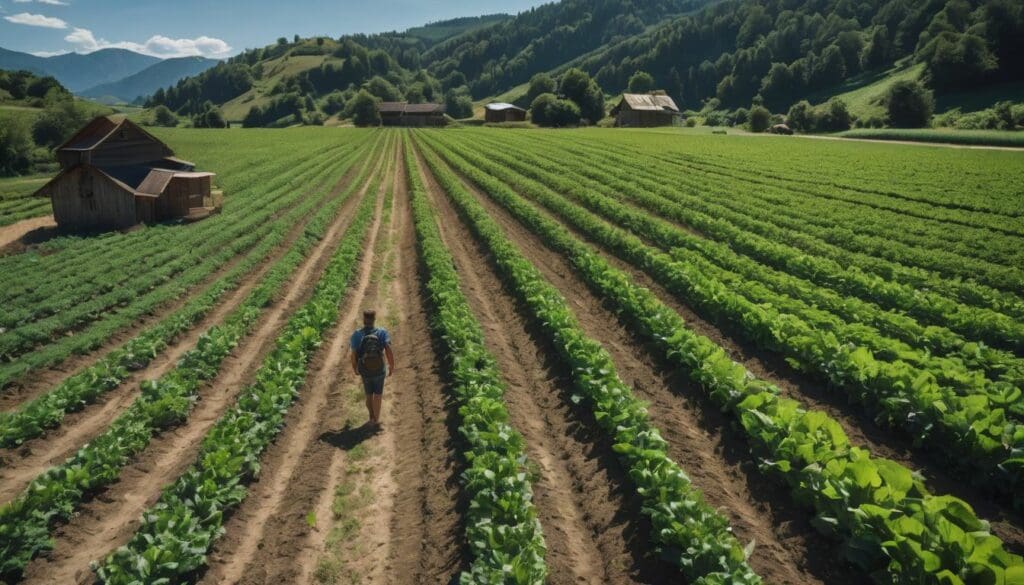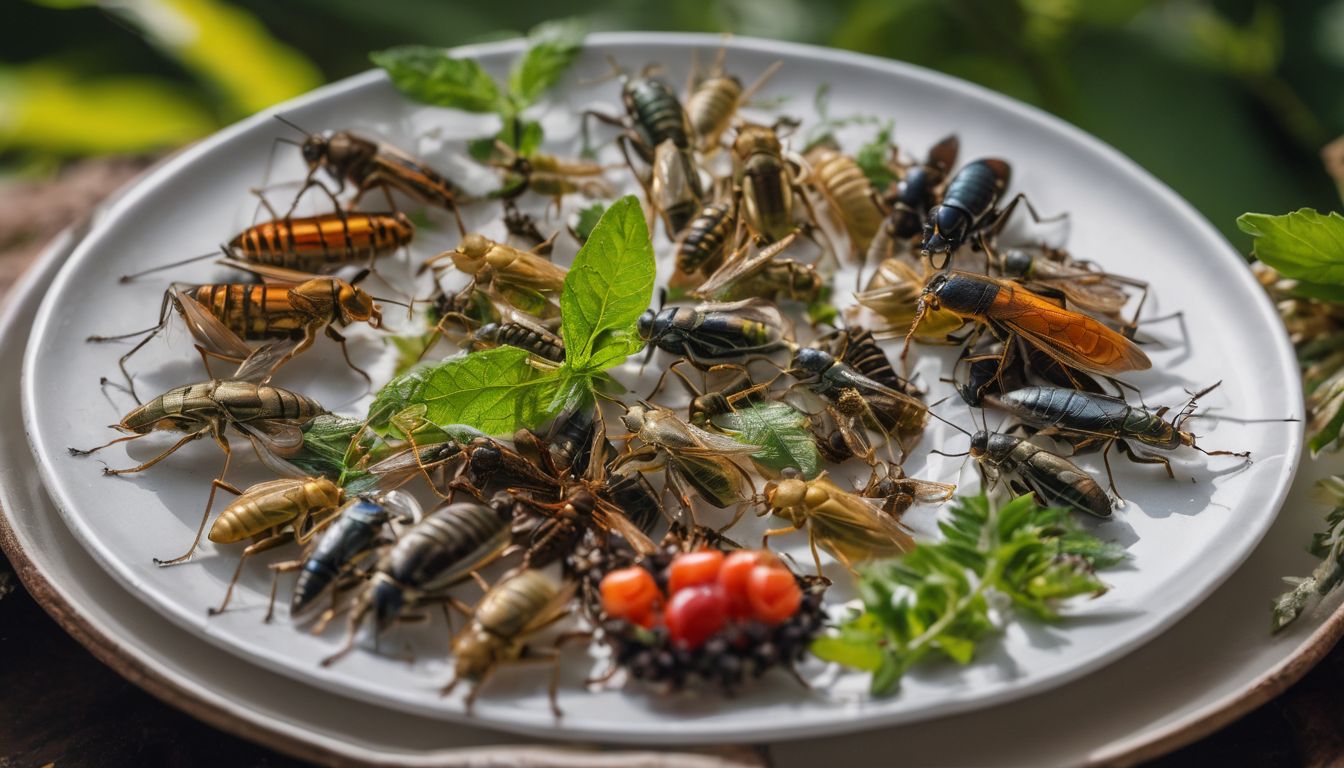Feeling overwhelmed by how your food is grown and its impact on the planet? Organic farming dates back over a century, offering an earth-friendly alternative. Our blog will take you through its evolution, showing how it can be part of the solution for a greener future.
Dive in to unearth its rich history!
Key Takeaways
- Organic farming started with traditional methods before WWII, focusing on soil health and crop variety, but shifted to synthetic fertilisers and pesticides post-war, leading to environmental problems.
- The 1960s environmental movement boosted organic farming by promoting sustainable practices such as no-till farming and biodynamic agriculture.
- Regulations at state and federal levels assure consumers of the quality of organic products by setting standards for production methods and certification processes.
- Organic farming brings multiple advantages including reducing chemical use, fostering biodiversity, improving soil fertility, and offering health benefits through nutrient-rich produce.
- With increasing demand for organically grown food, advancements in technology aid farmers in overcoming challenges associated with organic agriculture.
The Emergence and History of Organic Farming
Pre-World War II, traditional farming methods were the norm, with a focus on soil conservation and crop diversity. Post-World War II, synthetic fertilisers and pesticide use became widespread, leading to environmental concerns.
The environmental movement in the 1960s reignited interest in organic farming practices.
Pre-World War II
Organic farming found its roots in traditional farming techniques that date back centuries. Farmers relied on natural processes and local resources to grow food sustainably, understanding the importance of soil health and biodiversity conservation long before modern science explained these concepts.
They used crop rotation, composting, and animal manures to maintain soil fertility without synthetic fertilisers or pesticides.
The rise of industrial agriculture had not yet overshadowed these time-tested methods. Communities valued the connection between healthy land and healthy people, fostering a sense of stewardship for the environment amid agricultural practices.
With an increasing interest in ecological farming systems like biodynamic and permaculture, seeds were sown for the organic movement that would burgeon in response to post-war agricultural trends.
Post-World War II
Following the end of World War II, there was a shift towards industrialised farming methods that relied heavily on synthetic fertilisers and pesticides. This period marked a significant departure from traditional farming practices as technological advancements in agriculture became widespread.
As a result, the focus shifted towards maximising crop yield through intensive chemical usage.
This shift had both positive and negative impacts, leading to increased food production but also resulting in environmental degradation due to soil erosion and loss of biodiversity.
The post-World War II era saw the rise of large-scale monoculture farming, which further depleted natural resources and contributed to ecological imbalances.
Environmental movement
The environmental movement has played a pivotal role in the evolution of organic farming practices. Advocates pushed for sustainable agriculture, biodynamic farming, and regenerative agriculture.
These efforts have led to input substitution and systems design that prioritises environmental benefits.
Organic farming gained momentum due to the environmentally conscious individuals supporting conservation and environmental sustainability. This led to an increased demand for biocertified food, notill farming, agroecology, and natural farming methods.
Development of Organic Farming Practices
As organic farming emerged, the focus shifted towards sustainable practices to combat soil erosion and depletion, as well as addressing the lack of crop varieties. This led to the development of various organic farming methods that promote environmental conservation and biodiversity.
Soil erosion and depletion
Soil erosion and depletion pose significant challenges to organic farming. Soil erosion, caused by water or wind, can lead to the loss of fertile topsoil and essential nutrients, affecting crop growth.
This process is particularly concerning as it diminishes the soil’s ability to support healthy plant life and biodiversity. Organic farmers combat these issues by implementing sustainable agricultural practices such as cover cropping, minimal tillage, and crop rotation to prevent erosion and enhance soil health.
By maintaining a focus on soil conservation, organic farming contributes to preserving vital ecosystems and ensuring long-term sustainability.
To address soil depletion in organic farming, strategies like composting and using natural fertilisers are employed to replenish essential nutrients in the soil without relying on synthetic chemicals.
Lack of crop varieties
Organic farming faces challenges due to the limited range of crop varieties available for cultivation. This constraint arises from commercial agriculture’s focus on a few high-yielding crops, leading to reduced genetic diversity.
As a result, organic farmers encounter difficulties in finding suitable and resilient plant species that can thrive without synthetic inputs, making it crucial to promote and preserve heirloom and indigenous crop varieties.
Expanding the use of diverse crop species strengthens the resilience of organic farming systems. By cultivating a wider array of plants, farmers can mitigate pest and disease pressures, enhance soil health through varied root structures, and contribute to overall ecosystem biodiversity.
Organic farming methods
- Crop rotation
- Composting
- Natural fertilisers
- Pest control techniques
- Avoidance of synthetic chemicals
- Promotion of sustainable and traditional farming practices
Regulation of Organic Farming
Both state and federal regulations play a crucial role in ensuring the integrity of organic farming practices, providing standards for certification and labelling. To learn more about the impact of these regulations on organic farming, keep reading!
State regulation
State regulation of organic farming plays a crucial role in ensuring the authenticity and quality of organic produce. It involves setting standards for organic certification, inspecting farms to ensure compliance, and enforcing penalties for violations.
Through state regulation, consumers can trust that products labelled as “organic” meet specific criteria regarding production methods, avoiding synthetic pesticides or fertilisers, and promoting environmental sustainability.
State authorities work closely with farmers and certification bodies to maintain the integrity of the organic label, providing transparency and accountability within the industry.
Regulation at the state level also helps to support local organic farmers by creating a fair marketplace and preventing unfair competition from non-organic producers. By upholding strict guidelines for organic farming practices, states contribute to safeguarding natural resources while empowering consumers to make informed choices about their food purchases.
Federal regulation
Moving from state regulation to federal regulation, the oversight of organic farming practices becomes more standardised across the entire country. The U.S. Department of Agriculture (USDA) is responsible for setting and maintaining the standards for organic food certification.
This ensures that all certified organic products adhere to strict guidelines regarding production methods, handling, and labelling.
Additionally, the USDA oversees accredited certifying agents who inspect organic farms and ensure compliance with federal regulations. These measures provide consumers with confidence in the integrity of organic products while supporting environmentally conscious farming practices.
The Impact of Organic Farming
Organic farming has significant environmental benefits, such as reducing soil and water contamination, promoting biodiversity, and decreasing greenhouse gas emissions. To learn more about the impact of organic farming practices, keep reading!
Environmental benefits
Organic farming offers significant environmental benefits. By eschewing synthetic chemicals and promoting natural processes, it helps to conserve soil fertility and prevent harmful pesticides from seeping into water sources.
This practice also reduces air pollution by decreasing the use of fossil fuels for fertiliser production and transportation.
Furthermore, organic farming promotes biodiversity and supports wildlife conservation by providing a more natural habitat for various species to thrive. By safeguarding ecosystems and reducing the overall environmental impact, organic farming contributes positively to sustainability efforts.
Health benefits
Consuming organically grown food reduces the exposure to pesticides and other harmful chemicals, which can be beneficial for overall health. Organic farming practices also promote higher levels of nutrients in produce; studies have shown that organic fruits and vegetables contain more vitamins, minerals, and antioxidants.
This can lead to improved cardiovascular health, better digestion, and a stronger immune system.
Additionally, choosing organic products means supporting animal welfare. Organically raised animals are not exposed to antibiotics or growth hormones often used in conventional farming practices.
By consuming organic meat and dairy products, individuals reduce their intake of such harmful substances while promoting sustainable farming methods that prioritise the well-being of animals.
Economic impact
Organic farming has a positive economic impact, benefiting farmers and communities. By avoiding expensive synthetic fertilisers and pesticides, organic farmers reduce production costs.
As a result, they often achieve higher profit margins than conventional farmers. Additionally, the growing demand for organic produce presents an opportunity for farmers to access premium markets and command better prices for their crops.
Furthermore, the economic impact extends beyond the farm gate. Organic farming contributes to job creation in rural areas through increased labour demands for diverse agricultural practices such as composting, mulching, and biological pest control.
The Future of Organic Farming
The future of organic farming looks promising as there is an increasing demand for organic produce. Advancements in technology are helping farmers overcome challenges, and innovative solutions are being developed to ensure the continued success of organic farming practices.
Increasing popularity and demand
Organic farming is becoming increasingly popular due to growing consumer awareness about the environmental and health benefits. People are more conscious of supporting sustainable agriculture and reducing their impact on the environment.
As a result, there is a surge in demand for organic produce, leading to an expansion of organic farms and products available in stores.
More individuals are choosing organic products as they become aware of the pesticides and chemicals used in conventional farming practices. The increased popularity of farmer’s markets, organic grocery stores, and online platforms selling organic goods reflect this shift in consumer preferences towards environmentally friendly choices.
Advancements in technology
As organic farming gains popularity and demand, advancements in technology play a vital role in driving its growth. Innovations such as precision agriculture tools and digital monitoring systems are revolutionising the way organic farms operate.
These technologies enable farmers to optimise their resources, minimise waste, and enhance crop yields without compromising on environmentally friendly practices. Additionally, the use of drones for aerial imaging allows for efficient land management and early detection of potential issues, contributing to sustainable farming methods.
Furthermore, technological developments have led to the creation of eco-friendly pest control solutions that reduce reliance on harmful chemicals while maintaining high standards of crop quality.
Challenges and solutions
- Pest control – Using natural predators like ladybirds and birds to control pests can limit the need for chemical pesticides.
- Soil fertility – Crop rotation and cover cropping maintain soil health and fertility, reducing the need for synthetic fertilisers.
- Market access – Collaborative efforts to improve distribution channels can increase access to organic produce for consumers.
- Knowledge sharing – Training programmes and workshops provide farmers with the knowledge to adopt sustainable farming practices.
- Policy support – Lobbying for government policies that support organic farming can help create a conducive environment for growth.
Conclusion
In summary, organic farming has evolved significantly throughout history. Farmers have adapted to challenges and regulations while embracing sustainable practices. The impact of organic farming extends beyond environmental benefits to influencing health and economics.
Looking ahead, the future of organic farming holds promise as technology advances and demand continues to grow.
FAQs
1. What is organic farming?
Organic farming is growing crops without using synthetic pesticides, fertilisers or genetically modified organisms.
2. How has organic farming changed over the years?
Over the years, organic farming has included more sustainable methods and biodiversity to protect soil health and environment.
3. Can anyone start an organic farm?
Yes, anyone can start an organic farm with knowledge of natural agricultural practices and a commitment to avoid synthetic chemicals.
4. Is organic food really better than non-organic food?
Many people believe that organic food is better because it’s grown without harmful chemicals and often contains more nutrients.
5. Will I see different kinds of animals on an organic farm?
Yes, you might see a variety of animals on an organic farm as they often use livestock to improve crop production and biodiversity.





